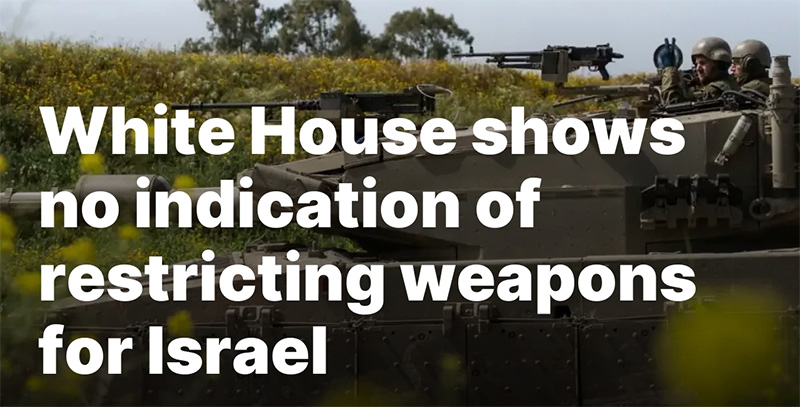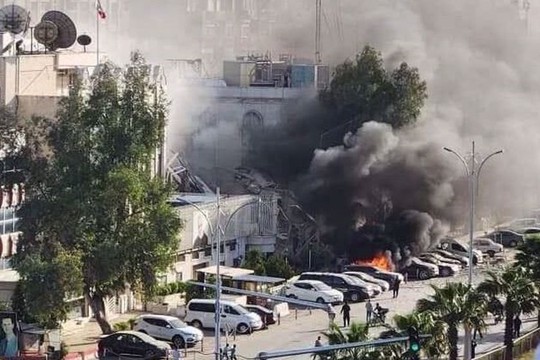A building of the Iranian Embassy in the Syrian capital of Damascus comes under a missile attack on April 1, 2024.
Photo: Press TV
As the assault on Gaza loses support, Netanyahu seemingly hopes to save himself by provoking retaliation from Iran, writes Paul R. Pillar, an ex-top analyst of the Central Intelligence Agency, a visiting professor at Georgetown University for security studies, at The Responsible Statecraft.
The latest Israeli heightening of violence in an already violent region presents the Biden administration with one of its biggest challenges yet in keeping the United States out of a new Middle East war.
Israel’s bombing of an Iranian diplomatic compound in Damascus, killing a senior commander in Iran’s Revolutionary Guard Corps and several other Iranian officials in addition to at least four Syrian citizens, was a marked escalation. Besides being as much an act of aggression in Syria as many previous Israeli aerial attacks, hitting the embassy compound constituted a direct attack on Iran.
Speaking a day after the attack, Iranian Supreme Leader Ali Khamenei vowed revenge and said “Israel will be punished.” The Iranian representative at the United Nations Security Council asserted Iran’s right to a “decisive response to such reprehensible acts.”
Iran will respond to the Israeli attack somehow. Predicting exactly which of the options available it will use is as difficult as Iranian leaders’ own decisions will be, as they try to balance the conflicting considerations weighing on them. All one can say with confidence is that Iranian responses will be at times and places of Tehran’s choosing.
But the bombing of the embassy facility in Damascus was a clear enough escalation (and expansion of Israeli offenses against the laws of war), that it probably reflected a carefully calculated decision at the highest levels of Benjamin Netanyahu’s government. The calculation did not have much to do with any dent, which is likely to be short-term and minimal, that loss of the IRGC officers would make in Iranian capabilities.
Rather, the attack was part of an effort to escalate Israel’s way out of a situation in which its declared objective of “destroying Hamas” is out of reach, the worldwide isolation of Israel because of its actions in Gaza is becoming undeniable, and even its habitually automatic U.S. backing has patently softened. For Netanyahu personally, escalating and expanding the war, insofar as this also means continuing it indefinitely, is also his only apparent hope for staving off his political and legal difficulties.
Escalation as an intended way for Israel to work its way out of the Gaza dead end has two elements. The main one is to provoke Iran to hit back, which can enable Israel to present itself as defending rather than offending and to push debate away from the destruction it is wreaking on Gaza and toward the need to protect itself against foreign enemies. The other element is to increase the chance of the United States getting directly involved in conflict with Iran. If it does, war in the Middle East would be seen as not just a matter of Israel bashing Palestinians but instead would involve equities of Israel’s superpower patron.
The United States could get dragged into an Israeli-Iranian conflict.
Israel’s paymasters in Washington have provided it far more than Iran ever provided to Hamas or any of its other friends. This fact underlies the statement by the Iranian representative at the Security Council that “the United States is responsible for all crimes committed by the Israeli regime.” That, and the fact that the Israeli attack on the Iranian embassy compound in Damascus, like the Israeli flattening of neighborhoods in Gaza, was carried out with U.S.-provided advanced military aircraft.
Despite frequent references in symmetrical terms to a “shadow war” between Iran and Israel, a compilation of events in that war shows an asymmetrical pattern of Israel initiating most of the violence and Iran mostly responding. For the United States to distance itself from this pattern would be not only in U.S. interests but also the interests of regional peace and security.

The Biden administration approved another weapons package for Israel this week that includes thousands of bombs as US military aid continues to flow unimpeded to support the slaughter of Palestinians in Gaza.
A Biden administration official told Reuters that arms shipment includes 1,000 MK82 500-pound bombs, more than 1,000 small-diameter bombs, and fuses for MK80 bombs. The bombs will be delivered by the end of the year.
Last week, Biden approved new munition shipments to Israel, including 2,000-pound bombs, and an F-35 deal worth $2.5 billion. He is expected to approve another major arms deal that includes 50 F-15 fighter jets and will be worth $18 billion.
Gaza’s Health Ministry said Thursday that the death toll in the US-backed Israeli campaign has surpassed 33,000, which includes about 14,500 children. The figure is considered a low estimate since it doesn’t include thousands who are dead under the rubble.
Israeli Army Chief Lt. Gen. Herzi Halevi has reportedly signed off on a plan to launch a major war on the country’s northern front with Lebanon. This comes amid growing escalation of Israeli attacks and a palpable sense that diplomatic efforts are not gaining much momentum in avoiding the conflict.
Israeli media regularly discusses the possibility, if not outright inevitability, of a full-bore conflict in Lebanon. With very recent Israeli strikes against UN observer teams in southern Lebanon and on the Iranian Consulate in Damascus, Syria, war looms closer than ever.
read more in our Telegram-channel https://t.me/The_International_Affairs

 10:56 08.04.2024 •
10:56 08.04.2024 •























